八年级英语下册第四单元
八年级下册英语第四单元2d知识点

第四单元2d知识点主要包括以下内容:1. 一般现在时:表示经常性的动作、习惯、常规或客观真理。
构成规则为主语+动词原形+其他。
例如:She plays basketball every day.(她每天都打篮球。
)3. 提问一般现在时:对一般问句,使用助动词do或does,将其放在句首。
例如:Do you like playing football?(你喜欢踢足球吗?)4. 否定句一般现在时:在一般现在时的否定句中,使用助动词donot或does not(缩写为don't和doesn't),结构为主语+助动词+动词原形。
例如:They don't live in New York.(他们不住在纽约。
)5. 特殊疑问词Who, What, Where, When, Why, How构成的特殊疑问句:特殊疑问句一般由特殊疑问词+一般疑问句构成。
例如:What do you like?(你喜欢什么?)6. 一般现在时的特殊用法:用于表示现在的倾向、事实、常态等。
例如:The earth revolves around the sun.(地球绕着太阳转。
)7. 隐性的情态动词:包括can, could, may, might等情态动词。
它们不能单独作为谓语使用,需要与动词原形连用。
例如:She can swim.(她会游泳。
)8. 祈使句:用于表示命令、建议、请求或劝告等。
肯定祈使句结构简单,直接使用动词原形;否定祈使句在肯定祈使句前加上don't。
例如:Please open the window.(请打开窗户。
)9. 数词和量词:用于表示具体的数量和个数。
例如:three books(三本书)、a cup of tea(一杯茶)。
10. 复数形式:用于表示大于一个的数量,以-s或-es结尾。
例如:dogs(狗)、boxes(盒子)。
11. 形容词比较级和最高级:形容词比较级用于表示两者之间的比较,一般在形容词后加-er,或在形容词前加more;形容词最高级表示三者或三者以上之间的比较,一般在形容词前加the 或在形容词后加-est,或在形容词前加most。
八年级下册英语第4单元
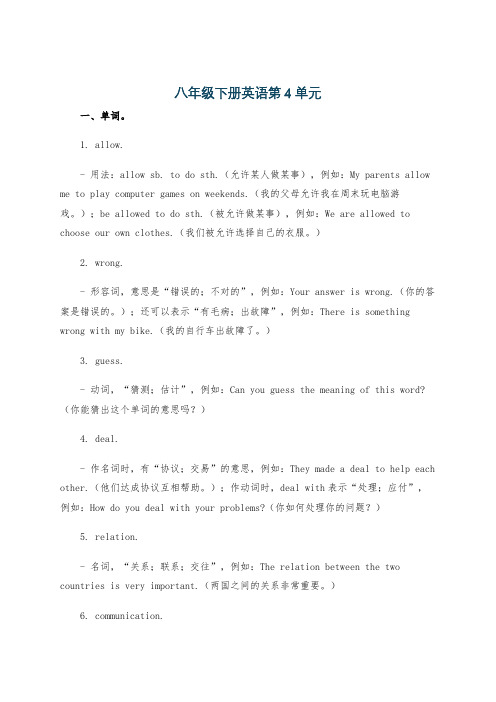
八年级下册英语第4单元一、单词。
1. allow.- 用法:allow sb. to do sth.(允许某人做某事),例如:My parents allow me to play computer games on weekends.(我的父母允许我在周末玩电脑游戏。
);be allowed to do sth.(被允许做某事),例如:We are allowed to choose our own clothes.(我们被允许选择自己的衣服。
)2. wrong.- 形容词,意思是“错误的;不对的”,例如:Your answer is wrong.(你的答案是错误的。
);还可以表示“有毛病;出故障”,例如:There is something wrong with my bike.(我的自行车出故障了。
)3. guess.- 动词,“猜测;估计”,例如:Can you guess the meaning of this word?(你能猜出这个单词的意思吗?)4. deal.- 作名词时,有“协议;交易”的意思,例如:They made a deal to help each other.(他们达成协议互相帮助。
);作动词时,deal with表示“处理;应付”,例如:How do you deal with your problems?(你如何处理你的问题?)5. relation.- 名词,“关系;联系;交往”,例如:The relation between the two countries is very important.(两国之间的关系非常重要。
)6. communication.- 名词,“交流;沟通”,例如:Good communication is very important in a family.(良好的沟通在家庭中非常重要。
)7. argue.- 动词,“争吵;争论”,例如:They often argue about little things.(他们经常为小事争吵。
人教版八年级英语下册Unit4全单元课件(共128张ppt)
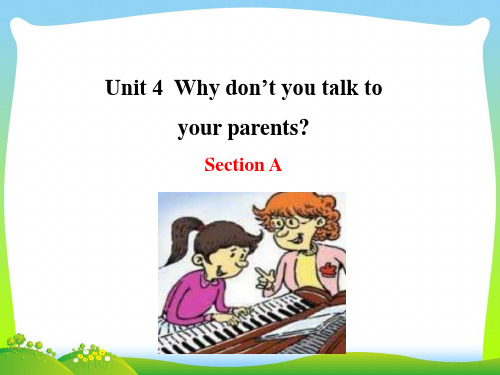
【用法辨析】“说”不同
及物动词, 常用于: tell sb. sth. =tell sth. to sb. 告诉 tell 某人某事
【归纳拓展】提出建议的句型
【活学活用】
①—Why don’t you
John a toy car for his birthday?
—Good idea! He is crazy about cars.
A. buy
B. buying
C. to buy
D. buys
②Why not go out for a rest? (改为同义句)
13、He who seize the right moment, is the right man.谁把握机遇,谁就心想事成。2021/7/212021/7/212021/7/212021/7/217/21/2021
14、谁要是自己还没有发展培养和教育好,他就不能发展培养和教育别人。2021年7月21日星期三2021/7/212021/7/212021/7/21
__c___ ___b__
3a Read the letters and complete the chart.
Problems
Advice
I can’t get on with my family.
talk about these feelings with your family
My parents fight a lot.
Unit 4 Why don’t you talk to your parents?
Section A
Lead in Look at these problems. Can you give some advice?
八年级下册英语第四单元单词表新人教版

八年级下册英语第四单元单词表(新人教
版)
八年级下册英语第四单元单词表(新人教版)
UWhy don't you talk to your parents?allow v.允许;准许
152 wrong adj.错误的,不对的
what's wrong ? 哪儿不舒服?guess v.猜测;估计deal n.协议;交易
big deal 重要的事work out 成功的发展;解决get on with和睦相处;关系良好lation n.关系;联系;交往unication n.交流;沟通argue v.争吵;争论
160 cloud n.云;云朵lder adj.年纪较长的
162 instead adv.代替;反而;却whatev任何;每一vous adj.焦虑的;担忧的主动提出;自愿给予adv.
正确地;恰当地dly adv.第二;其次unicate v.交流;沟通xplain v.解释;说明
170 clear adj.清楚易懂的;不含混的v.复制;复印
172 return v.回来;回去ber n.成员;分子ure n.压力v.竞争,对抗意见;想法;看法ll n.技艺;技巧
al adj.典型的ball n.足球
180 cut out 删去;删除ue v.持续;继续存在
182 compare v.比较are…with… 比较;对比azy adj.不理智的;疯狂的ush v.推动;移动devel发展;发育;成长ause v.造成;引起usual adj.通常的;寻常的aps adv.可能;大概;也许。
八年级下册英语单词第四单元

八年级下册英语单词第四单元allow [əˈlaʊ] v. 允许;准许wrong [rɔːŋ] adj. 有毛病;错误的What's wrong? 哪儿不舒服?midnight [ˈmɪdnaɪt] n. 午夜;子夜look through 快速查看;浏览guess [ɡes] v. 猜测;估计deal [diːl] n. 协议;交易big deal 重要的事work out 成功地发展;解决get on with 和睦相处;关系良好relation [rɪˈleɪʃn] n. 关系;联系;交往communication [kəˌmjuːnɪˈkeɪʃn] n. 交流;沟通argue [ˈɑːɡjuː] v. 争吵;争论cloud [klaʊd] n. 云;云朵elder [ˈeldə(r)] adj. 年纪较长的instead [ɪnˈsted] adv. 代替;反而;却whatever [wɒtˈevə(r)] pron. 任何;每一nervous [ˈnɜːvəs] adj. 焦虑的;担忧的offer [ˈɒfə(r)] v. 主动提出;自愿给予proper [ˈprɒpə(r)] adj. 正确的;恰当的secondly [ˈsekəndli] adv. 第二;其次communicate [kəˈmjuːnɪkeɪt] v. 交流;沟通explain [ɪkˈspleɪn] v. 解释;说明clear [klɪə(r)] adj. 清楚易懂的;晴朗的copy [ˈkɒpi] v. 复制;复印return [rɪˈtɜːn] v. 归还;回来;返回anymore [ˈenɪmɔː(r)] adv. (常用于否定句和疑问句末)再也(不);(不)再member [ˈmembə(r)] n. 成员;分子pressure [ˈpreʃə(r)] n. 压力compete [kəmˈpiːt] v. 竞争;对抗opinion [əˈpɪnjən] n. 意见;想法;看法skill [skɪl] n. 技艺;技巧typical [ˈtɪpɪkl] adj. 典型的football [ˈfʊtbɔːl] n. (美式)橄榄球;足球cut out 删去;删除quick [kwɪk] adj. 快的;迅速的;时间短暂的continue [kənˈtɪnjuː] v. 持续;继续存在compare [kəmˈpeə(r)] v. 比较compare...with 比较;对比crazy [ˈkreɪzi] adj. 不理智的;疯狂的push [pʊʃ] v. 鞭策;督促;推动development [dɪˈveləpmənt] n. 发展;发育;成长cause [kɔːz] v. 造成;引起usual [ˈjuːʒuəl] adj. 通常的;寻常的in one's opinion 依……看perhaps [pəˈhæps] adv. 可能;大概;也许。
人教版八年级下册英语第四单元范文

人教版八年级下册英语第四单元范文English:In Unit 4 of the 8th grade English textbook, we learned about different cultures and customs around the world. We explored various traditions and festivals from countries such as China, the United States, and India. Through these cultural studies, we gained a deeper understanding of the importance of respecting and appreciating diversity. We also practiced expressing our own thoughts and opinions about different customs and traditions, and learned how to communicate with people from different cultural backgrounds. Overall, this unit helped us broaden our knowledge of the world and become more open-minded individuals.中文翻译:在人教版八年级下册英语教材的第四单元中,我们学习了世界各地不同的文化和习俗。
我们探索了来自中国、美国和印度等国家的各种传统和节日。
通过这些文化研究,我们更深刻地了解了尊重和欣赏多样性的重要性。
我们还练习了表达自己对不同习俗和传统的想法和观点,并学会了如何与来自不同文化背景的人沟通。
总的来说,这个单元帮助我们拓宽了对世界的认识,成为更加开明的个体。
八年级下册下册英语第四单元英语作文
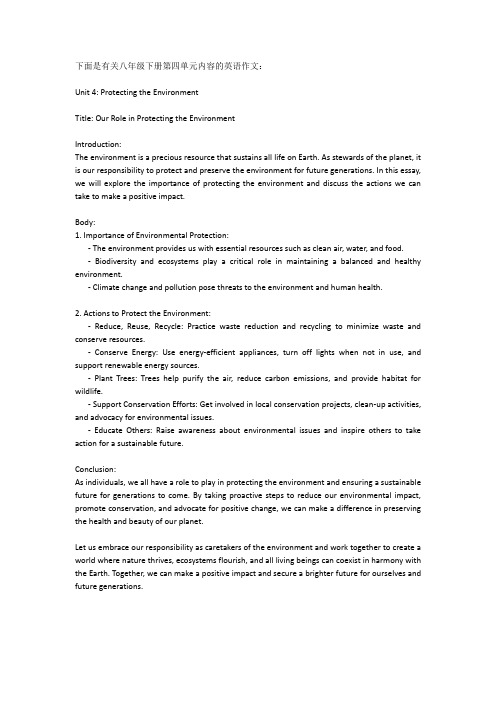
下面是有关八年级下册第四单元内容的英语作文:Unit 4: Protecting the EnvironmentTitle: Our Role in Protecting the EnvironmentIntroduction:The environment is a precious resource that sustains all life on Earth. As stewards of the planet, it is our responsibility to protect and preserve the environment for future generations. In this essay, we will explore the importance of protecting the environment and discuss the actions we can take to make a positive impact.Body:1. Importance of Environmental Protection:- The environment provides us with essential resources such as clean air, water, and food.- Biodiversity and ecosystems play a critical role in maintaining a balanced and healthy environment.- Climate change and pollution pose threats to the environment and human health.2. Actions to Protect the Environment:- Reduce, Reuse, Recycle: Practice waste reduction and recycling to minimize waste and conserve resources.- Conserve Energy: Use energy-efficient appliances, turn off lights when not in use, and support renewable energy sources.- Plant Trees: Trees help purify the air, reduce carbon emissions, and provide habitat for wildlife.- Support Conservation Efforts: Get involved in local conservation projects, clean-up activities, and advocacy for environmental issues.- Educate Others: Raise awareness about environmental issues and inspire others to take action for a sustainable future.Conclusion:As individuals, we all have a role to play in protecting the environment and ensuring a sustainable future for generations to come. By taking proactive steps to reduce our environmental impact, promote conservation, and advocate for positive change, we can make a difference in preserving the health and beauty of our planet.Let us embrace our responsibility as caretakers of the environment and work together to create a world where nature thrives, ecosystems flourish, and all living beings can coexist in harmony with the Earth. Together, we can make a positive impact and secure a brighter future for ourselves and future generations.。
八年级下册英语第四单元课堂笔记
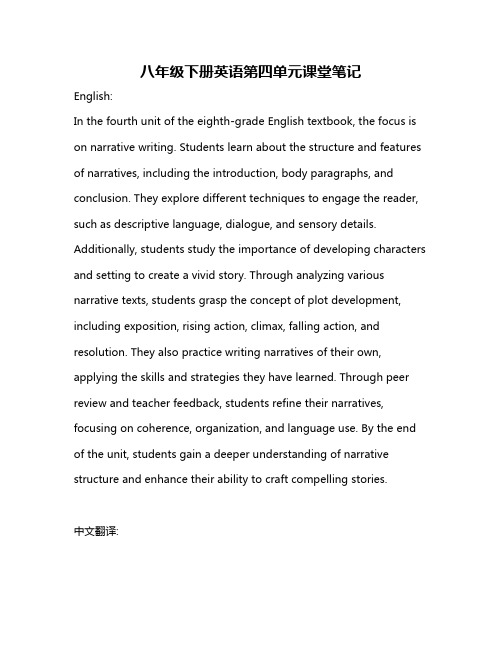
八年级下册英语第四单元课堂笔记English:In the fourth unit of the eighth-grade English textbook, the focus is on narrative writing. Students learn about the structure and features of narratives, including the introduction, body paragraphs, and conclusion. They explore different techniques to engage the reader, such as descriptive language, dialogue, and sensory details. Additionally, students study the importance of developing characters and setting to create a vivid story. Through analyzing various narrative texts, students grasp the concept of plot development, including exposition, rising action, climax, falling action, and resolution. They also practice writing narratives of their own, applying the skills and strategies they have learned. Through peer review and teacher feedback, students refine their narratives, focusing on coherence, organization, and language use. By the end of the unit, students gain a deeper understanding of narrative structure and enhance their ability to craft compelling stories.中文翻译:八年级英语教材的第四单元侧重于叙事写作。
八年级下册英语外研版第四单元单词

八年级下册英语外研版第四单元单词Module 4this /ðɪs/ 这;这个cold /kəʊld/ 寒冷的;冷的pet /pet/ 宠物active /'æktɪv/ 积极的;活跃的exercise /'eksəsaɪz/ 活动;运动headache /'hedeɪk/ 头疼toothache /'tu:θeɪk/ 牙疼sleepy /'sli:pi/ 困的;欲睡的all over 到处;各处ill /ɪl/有病;不舒服take /teɪk/ 学习;上(课)then /ðen/ 那时well /wel/ 健康;身体好took /tʊk/ (take的过去式)拍照health /helθ/ n.健康;认得身体(或精神)状态heart /hɑ:(r)t/ n.内心;心脏cough /kɒf/, /kɔ:f/ v.&n.咳嗽fever /'fi:və(r)/ n.发烧stomach /'stʌmək/ n.胃;腹部since /sɪns/ conj.因为;既然;prep.conj,&adv.从……以后;自……以来member /'membə(r)/ n.成员;分子perhaps /pə(r)'hæps/ adv.可能;大概;也许condition /kən'dɪʃn/ n.条件;状况illness /'ɪlnəs/ n.疾病;病daily /'deɪli/ adj.每日的;日常的awful /'ɔ:fl/ adj.很坏的;讨厌的weak /wi:k/ adj.虚弱的;无力的fast food 快餐stomach ache /'stʌmək eɪk/ 胃疼;腹痛ache /eɪk/ n.痛;疼痛catch a cold 感冒feel awful 感到不舒服in excellent condition 健康状况很好take part in sth. 参加;参与(某事)take sb.'s temperature 量某人的体温taken /'teɪkən/ v.(用机器)测定,量取,拍摄;(尤指有规律地)吃,喝(过去分词)。
八年级英语下册第四单元单词

人教版八年级英语下册第四单元单词一、重点单词1. allow /əˈlaʊ/ v. 允许;准许2. wrong /rɔːŋ/ adj. 有毛病;错误的3. What's wrong? 哪儿不舒服?4. midnight /ˈmɪdnaɪt/ n. 午夜;子夜5. look through 快速查看;浏览6. guess /ɡes/ v. 猜测;估计7. deal /diːl/ n. 协议;交易8. big deal 重要的事9. work out 成功地发展;解决10. get on with 和睦相处;关系良好11. relation /rɪˈleɪʃn/ n. 关系;联系;交往12. communication /kəˌmjuːnɪˈkeɪʃn/ n. 交流;沟通13. argue /ˈɑːɡjuː/ v. 争吵;争论14. cloud /klaʊd/ n. 云;云朵15. elder /ˈeldə(r)/ adj. 年纪较长的16. instead /ɪnˈsted/ adv. 代替;反而;却17. whatever /wɒtˈevə(r)/ pron. 任何;每一18. nervous /ˈnɜːvəs/ adj. 焦虑的;担忧的19. offer /ˈɒfə(r)/ v. 主动提出;自愿给予20. proper /ˈprɒpə(r)/ adj. 正确的;恰当的21. secondly /ˈsekəndli/ adv. 第二;其次22. communicate /kəˈmjuːnɪkeɪt/ v. 交流;沟通23. explain /ɪkˈspleɪn/ v. 解释;说明24. clear /klɪə(r)/ adj. 清楚易懂的;晴朗的25. copy /ˈkɒpi/ v. 复制;复印26. return /rɪˈtɜːn/ v. 归还;回来;返回27. anymore /ˌeniˈmɔː(r)/ adv. (常用于否定句和疑问句末)再也(不);(不)再二、拓展词汇1. pressure /ˈpreʃə(r)/ n. 压力2. compete /kəmˈpiːt/ v. 竞争;对抗3. opinion /əˈpɪnjən/ n. 意见;想法;看法4. skill /skɪl/ n. 技艺;技巧5. typical /ˈtɪpɪkl/ adj. 典型的6. football /ˈfʊtbɔːl/ n. 足球;橄榄球7. continue /kənˈtɪnjuː/ v. 持续;继续存在8. compare /kəmˈpeə(r)/ v. 比较9. crazy /ˈkreɪzi/ adj. 不理智的;疯狂的10. push /pʊʃ/ v. 鞭策;督促;推动11. development /dɪˈveləpmənt/ n. 发展;发育;成长12. cause /kɔːz/ v. 造成;引起13. usual /ˈjuːʒuəl/ adj. 通常的;寻常的。
八年级下册英语第四单元知识点

八年级下册英语第四单元知识点知识是人们前进的最大动力,因为有知识,我们知道我们从哪里来,也知道我们将要到哪里去。
接下来小编给大家分享关于八年级下册英语第四单元知识,希望对大家有所帮助!八年级下册英语第四单元知识1重要词汇和句型1.get ( 1 ) 买 get sth. for sb.== get sb. sth. 为某人买某物Can you get some fruit for me when you go shopping?==Can you get me some fruit when you go shopping?( 2 ) 得到, 到达 Where did you get the book?When did you get the letter ?He got home late last night.(3) 使, 让 get + 宾语 + 宾补使某人\ 某物怎么样Please get you coat clean. Get your mouth closed.get sb. to do sth. 使某人\ 某物做某事I got him to call Jim yesterday.(4) ( 逐渐) 变得…The weather gets warmer and days get longer.Why did the teacher get angry?2. how about\ what about 后跟名词\ 代词\ 动词ing形式。
( 1) 向对方提出建议或请求How about going out for a walk?How about something to eat(2) 向对方征求意见或看法How about the TV play? How about buying thehouse now ?( 3 ) 询问天气或身体情况How about the weather in Hainan Island ?How about your parents? Are they living with you?( 4 ) 谈话中承接上下文I’m forty years old. How about you ?I’m from Beijing . How about you?3. receive 收到 The girl was happy to receive many gifts on her birthd ay.receive aletter from == get a letter from == heard from 收到某人的信I received a letter from my parents last Sunday.== I got a letter from my parents last Sunday.== I heard from my parents last Sunday.accept 接受 He couldn’t accept our suggestions but our gifts.She was very glad to receive the invitation.He didn’t receive a good education at university.I received an invitation to the party, but I refused to a ccept it.4. a 6--year– old child 一个六岁的孩子6--year –old 是由“数词 +名词 + 形容词” 构成的复合形容词, 作前置定语,修饰后面的名词child .数词+名词+形容词构成的复合形容词,中间的名词要用单数形式:a five-year-old girl 一个五岁的女孩a six-foot-deep hole 一个六英尺深的洞a two-meter-long ruler 一把两米长的尺子 a 100-meter race 一场百米赛跑 a ten-story-high building 一栋十层高的楼房 a two-inch-thick dictionary一本两英寸厚的词典5. too…to… 太……而不能……too …to… 可以与 enough to 和so… that … 转换.与enough to转换时, enough 前的形容词, 副词必须是too 后面形容词,副词的反义词, 并使用其否定句式.She is too young to do the work .she isn’t old enough to do the work .与so… that … 转换时, that 后面的从句要用否定形式.Tom is too tired to walk any farther .Tom is so tired that he can’t walk any farther(2 ) 名词, 成本, 费用, 价钱. at all costs不惜任何代价;at the cost of 以…… 为代价.Living costs are higher in cities than that in the country.We must stop it at all costs .After the earthquake, the soldiers tried to reach the ar ea at thecost of their lives.7. pay, spend , cost , take 的区别pay 花费( 多少钱) , 主语是人. Sb. pay some money for sth.I paid 5000 yuan for the computer last week.Spend 花费( 多少钱或时间),主语是人. Sb. spend somemoney on sth.Sb. spend some time (in ) doing sth.I spent 5000 yuan on the computer last week.She spent 2 hours (in ) doing her homework .cost 花费 ( 多少钱 ) , 主语是物. Sth. cost sb. some money.This jacket cost him 200 dollars.take 花费 (时间 ),It takes sb. some time to do sth.花费某人多少时间做某事How long does it take sb. to do sth?花费某人多少时间做某事?It took Liu Hong 2 hours to do her homework.It takes me 10 minutes to walk to school from home.It will take them 6 months to build the building.How long does it take him to plant the trees ?8. sleep, sleeping, sleepy , asleep, fall asleep , be asle epsleep 动词, 睡觉, 强调动作. I am very tired.I want to sleep .He slept for 12 hours yesterday.sleeping, Sleep 的现在分词, 表示“ 正在睡觉”Don’t make so much noise. The baby is sleeping .They woke up the sleeping girl andasked her where her parents were .sleepy 想睡觉的, 困倦的. I am a little sleepy . I’d like to go to bed.asleep 睡着了的.Theteacher found Tom asleep in class andkept him behind after school .Would you mind turning down the TV? The baby is as leep .fall asleep 强调从没有睡着到睡着的过程, 不能接一段时间I couldn’t fall asleep until it was very late last night.He listened to music and fell asleep.be asleep 表示睡着后的状态, “ 睡着了”, 可以接一段时间 .He was asleep for three hours.9. choose 动词, “ 选择,挑选” , 过去式chose, 过去分词chosenchoose to do sth. 选择做某事can’t Choose but 只得……pick and choose 挑挑拣拣There are many books to choose from .We choose mike as our leader( 领导 ).Will you help me choose a dictionary?Everyone can’t choose but obey( 服从 ) .It’s her habit (习惯 ) to pick and choose while shopping.10. present (1) 礼物, 礼品 == gift Why not givehim a card as a present ?what can I get him for a birthday present ?(2 ) 目前, 现在I’m sorry he is out at present .Youhaveto forget the past and start living in the present .11. open (1 ) 动词, 打开 , 开业, 开张, 展现It’s not right to open other people’s letters.Would you mind opening the window?The door opens to the south.This factory opened in 1998.(2 ) 形容词, be open 开着的, 开放的In his dream the flowers are all open .Most shops are closed but several are still open .On weekends the swimmingpool is open to the public .close 动词, 关闭, 关上 , 合上Please close the door to keep the cold out.closed 形容词, be closed 关着的, 关闭的when we got to the shop it was closed .12 . give away 赠送 , 分发 give away sth to sbAunt Wang gave away the candies (糖果 ) to the kids .John gave away his notebook to me .其它短语 give up 放弃 give back 归还 give off 放出, 发出(气味)give sth to sb == give sb. sth . 把某物给某人13. rather than 而不是…… 后面跟名词, 代词, 从句The color seems green rather than blue .If you ran rather than walked , you would have arrived earlier .We depend on you rather than on him .You should help them rather than they should help you .prefer to do sth rather than do sth . 宁愿…… ,也不……She preferred to stay at home rather than go with us .He preferred to listen to music rather than play games .Would rather do sth than do sth . 宁愿…… ,也不……He would rather play than work .I would rather take the slowest train than go there by air .14. instead (1) 位于句首, 表示“ 反而, 相反”Ididn’t go to the cinema last night . instead, I watched a football match on TV.The boy didn’t sing to the music . Instead , he sang his own way .( 2 ) 位于句尾, 表示“ 作为代替, 而是”Mr smith was ill , so mr green was taking his class ins tead .I don’t like this one , please give me that instead .instead of 后跟名词, 代词, 动名词, 介词短语.表示“ 代替, 而不是”I have come instead of my brother . He is ill .We walked down the stairs instead of taking the elevator ( 电梯 ) .He studies in the evening instead of during the day .15. enter (1) 参加 == take part in \ joinMore than one thousand sportsmen entered \ took part in the games .My brother hopes to enter \ join the army next year .( 2 ) 进入 ==come into \ go intoShe entered\ came into the room with these words .Did you see someone enter \ go into the house ?16. encourage 动词, 鼓励, 激励 encourage sb. to do sth.鼓励某人做某事Parents should encourage children to do things by the mselves .Our English teacher encourages us to keep a dairy in English .17. progress 名词, “ 进步, 进展” make progress “取得进步, 取得进展”My parents are pleased with my progress in lessons .Tom is now making much \ great progress at school .They made no progress in the heavy snow .18. suggest 动词, 建议, 提议. 后跟名词, 代词, 动名词和从句she suggested a way out of the difficulty .he suggested going home .who suggested you staying here ?I suggested we ( should ) hold a meeting .19. take an interest in ( doing ) sth. 对 ( 做 )某事感兴趣否定表达是 take no interest in ( doing ) sth. 对 ( 做 )某事不感兴趣Do you take an interest in English ?Most children take an interest in playing computer ga mes .He takes no interest in playing basketball .be \ become interested in ( doing ) sth对 ( 做 )某事感兴趣I’m deeply interested in swimming .She becameinterested in singing when she was only 7 years old .20. Three good ways of improving English are mention ed .提到了三种提高英语的好方法.of improving English是介词短语作定语修饰ways . 它相当与动词不定式.Three good ways of improving English are mentioned .===Three good ways to improve English are mentioned .Can you find a way to work out the problem ?==Can you find a way of working out the problem ?Fast is another way of saying quick .== Fast is another way to say quick .Mention (1) 动词, “ 提到, 提及, 说起”as mentioned above 如上所述He often mentioned his past to me .Nobody mentioned anything to me about it .Did she mention where she was going ?You mentioned in your letter that you might be movin g abroad .As mentioned above , there are many good ways to learn English well .( 2 ) 名词, “ 提及, 说起”The newspaper made no mention of him .21. make friends with sb. 和某人交朋友Would you like to make friends with us ?I find it difficult to make friends with Ben .八年级下册英语第四单元知识2形容词一、形容词(一)形容词的含义:表示人或事物的特征、性质、状态的词叫形容词。
八年级英语下册第四单元重点短语

八年级英语下册第四单元重点短语新人教版八年级英语下册第四单元重点短语英语是按照分布面积而言最流行的语言,但母语者数量是世界第三,仅次于汉语、西班牙语。
它是学习最广泛的第二语言,是近60个主权国家的官方语言或官方语言之一。
下面是店铺为大家收集的八年级英语下册第四单元重点短语,欢迎阅读,希望大家能够喜欢。
八年级英语下册第四单元重点短语1.have free tie有空闲时间2.allw sb.t d sth.允许某人做某事3.hang ut with sb.与某人闲逛4.after-schl classes课外活动课5.get int a fight w ith sb.与某人吵架/打架6.until idnight直到半夜7.tal t sb.与某人交谈8.t an太多9.stud t uch学得过多10.get enugh sleep有足够的睡眠11.write sb.a letter给某人写信12.call sb.up打电话给某人13.surprise sb.令某人惊讶14.l thrugh翻看15.be angr with sb.生某人的气16.a big deal重要的'事17.wr ut成功地发展;解决18.get n with不 11睦相处;关系良:19.fight a lt经常吵架/打架20.hang ver笼罩21.refuse t d sth.拒绝做某事22.ffer t d sth.主动提出做某事23.s that以便24.ind sb.ding sth.介意某人做某事25.all the tie一直26.in future今后27.ae sb.angr使某人生气28.wrr abut sth.担心某事29.cp ne’ s hewr抄袭某人的作业30.be neself做自己31.fail ebers32.spend tie alne独自消磨时光33.give sb.pressure给某人施压34.have a fight w ith sb.与某人吵架35.cpete w ith sb.与某人竞争36.free tie activities业余活动37.get better grades取得更好的成绩38.give ne’ s pinin提出某人的观点39.learn exa sills学习应试技巧40.practice sprts体育训练41.cause stress造成压力42.cut ut删除八年级英语下册第四单元词组短语整理1.ad.很生气的;气愤的2.adv.再也(不);(不)再;3.n.小吃4.直接引语5.间接引语6.首先7.n.消息;信息8.传递9.v.假定;认为;期望10.被期望或被要求…11.ad.勤勉的,努力工作的12.在……方面做得好13.n.爷爷;外祖父14.身体健康15.成绩单16.ad.神经紧张的;不安的17.n.信封18.v.回来;返回19.n.学期20.中国少年先锋队21.ad.真实的22.ad.使人失望的;令人扫兴的23.ad.幸运的24.v.复制;抄袭25.prn.(名词性物主代词)她的26.ad.自己的27.克服;恢复;原谅28.ad.贫穷的;穷困的29.n.乡村30.北京大学31.n.大学毕业生32.n.志愿者33.教育部34.ad.乡下的,乡村的35.n.地区;地域36.n.米;公尺37.海平面38.ad.稀薄的39.v.(eat的过去式)40.adv.幸运地41.n.决定;决心42.n.丈夫43.n.宿舍44.高中45.打开46.n.开始;开端47.n.影响48.v.回来;返回49.n.家乡;故乡50.照料;照顾51.n.边界,边境52.addr.联合国儿童基金会53.abbr.世界野生动物基金会54.“绿色和平”组织55.n.危险【新人教版八年级英语下册第四单元重点短语】。
人教版(新目标)初中英语八年级下册Unit 4

Unit4 Why don't you talk to your parents?八年级下册Unit 4 单词来自初中英语人教版00:0003:37八年级下册Unit 4 Section A来自初中英语人教版00:0005:28八年级下册Unit 4 Section B来自初中英语人教版00:0004:24点击上方绿标即可收听音频◆◆◆Unit 4单词(音标)allow [əˈlaʊ] v. 允许,准许wrong [rɔŋ] adj. 错误的What's wrong? 哪儿不舒服?midnight ['mɪdnaɪt] n. 午夜,子夜look through 浏览,快速查看guess [ɡes] v. 猜测,估计deal [di:l] v. 处理,应付big deal 重要的事work out 成功地发展,解决get on with 和睦相处,关系良好relation [rɪˈleɪʃn] n. 关系,联系,交往communicate [kəˈmju:nikeit] v. 沟通,通信,通讯communication [kəˌmju:nɪˈkeɪʃn] n. 交流,沟通argue [ˈɑ:ɡju:] v. 争论,争吵cloud [klaʊd] n. 云elder ['eldə(r)] adj. 年级较长的instead [ɪnˈsted] adv. 代替whatever [wɒtˈevər] pron. 任何,不管什么,无论什么nervous [ˈnə:vəs] adj. 紧张不安的offer ['a:fər] v. 提供,自愿给予proper [ˈprɔpə] adj. 合适的,适当的secondly [ˈsekəndli] adv. 第二,其次explain [ɪkˈspleɪn] v. 讲解,解释,说明clear [klɪə] adj. 清晰的,清楚易懂的copy [ˈkɔpi] v. 复制return [rɪ'tɜ:n] v. 回来,返回,归还anymore ['enɪmɔ:] adv. 不再,再也不member [ˈmembə] n. 成员,会员pressure ['preʃə(r)] n. 压力compete [kəm'pi:t] v. 比赛,竞争opinion [əˈpɪnjən] n. 意见,想法,看法skill [skɪl] n. 技能,技巧typical [ˈtɪpɪkl] adj. 典型的football [ˈfʊtbɔ:l] n. 足球cut out 删去,删除quick [kwɪk] adj. 快的,迅速的continue [kənˈtɪnju:] v. 继续,连续compare [kəm'peə] v. 比较compare…with 比较,对比crazy [ˈkreɪzɪ] adj. 疯狂的,狂热的development [diˈveləpmənt] n. 发育,成长,发展cause [kɔ:z] n. & v. 原因;造成,使发生usual [ˈju:ʒuəl] adj. 通常的,平常的in one's opinion 依… 看perhaps [pəˈhæps] adv. 可能,大概,也许Unit4 课本教材Unit4 知识梳理【重点单词】1.have free time有空闲时间2.allow sb. to do sth. 允许某人做某事3.hang out with sb. 与某人闲逛4. after-school classes课外活动课5. get into a fight with sb.与某人吵架/打架6. until midnight直到半夜7. talk to sb. 与某人交谈8. too many太多9. study too much学得过多10. get enough sleep有足够的睡眠11. write sb. a letter给某人写信12. call sb. up打电话给某人13. surprise sb. 令某人惊讶14. look through翻看15. be angry with sb. 生某人的气16. a big deal重要的事17. work out成功地发展;解决18. get on with与...相处19. fight a lot经常吵架/打架20. hang over笼罩21. refuse to do sth. 拒绝做某事22. offer to do sth. 主动提出做某事23. so that以便24. mind sb. doing sth. 介意某人做某事25. all the time一直26. in future今后27. make sb. angry使某人生气28. worry about sth. 担心某事29. copy one’ s homework抄袭某人的作业30. be oneself做自己31. family members32. spend time alone独自消磨时光33. give sb. pressure给某人施压34. have a fight with sb. 与某人吵架35. compete with sb. 与某人竞争36. free time activities业余活动37. get better grades取得更好的成绩38. give one’ s opinion提出某人的观点39. learn exam skills学习应试技巧40. practice sports体育训练41. cause stress造成压力42. cut out删除【重点句型】1. I studied until midnight last night so I didn't get enough sleep. 我昨晚学习到半夜所以睡眠不足。
龙陵县第三中学八年级英语下册Unit4Whydon'tyoutalktoyourparentsRev

7. Reading and writing are two basic learning ___sk__il_ls__ (skill).
8. After she took a short break, she _c_o_n_ti_n_u_e_d_ (continue) climbing the mountain.
即
一、根据句意及汉语提示完成单词。
时 演 1. When we _c_o_m__p_a_r_e_ (比较) western culture
练
with Chinese culture, you’ll find many
differences.
2. After a ___q_u_ic_k___ (迅速的) breakfast, I ran
A. /; a B. the; a C. an; the D. a; the
2. If you want to know more about universe(宇宙),
please _______ the book A Brief History of Time.
A. look through
B. look around
allow sb. to do sth. look through get into/have a fight with … call sb. give back be angry with sb.
7. 重要的事 8. 成功地开展;解决 9. 和睦相处;关系良好 10. 和……沟通 11. 下次 12. 交朋友
5. With the _d_e_v_e_lo_p_m__e_n_t_ (develop) of science and technology, life is becoming much easier.
八年级下册英语第四单元2d知识点
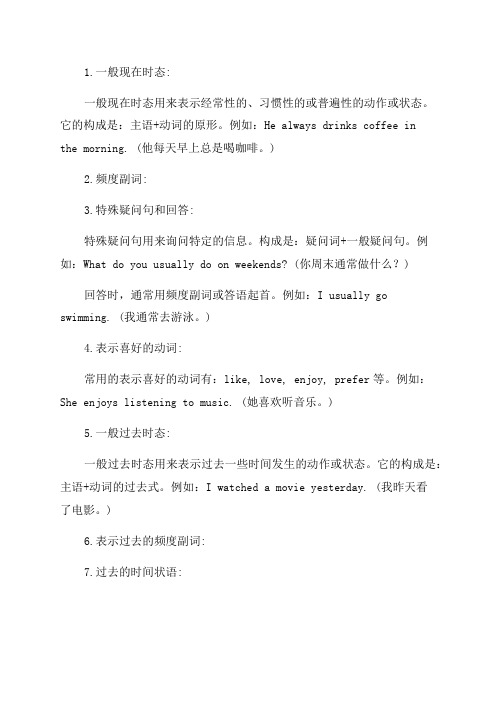
1.一般现在时态:一般现在时态用来表示经常性的、习惯性的或普遍性的动作或状态。
它的构成是:主语+动词的原形。
例如:He always drinks coffee inthe morning. (他每天早上总是喝咖啡。
)2.频度副词:3.特殊疑问句和回答:特殊疑问句用来询问特定的信息。
构成是:疑问词+一般疑问句。
例如:What do you usually do on weekends? (你周末通常做什么?)回答时,通常用频度副词或答语起首。
例如:I usually go swimming. (我通常去游泳。
)4.表示喜好的动词:常用的表示喜好的动词有:like, love, enjoy, prefer等。
例如:She enjoys listening to music. (她喜欢听音乐。
)5.一般过去时态:一般过去时态用来表示过去一些时间发生的动作或状态。
它的构成是:主语+动词的过去式。
例如:I watched a movie yesterday. (我昨天看了电影。
)6.表示过去的频度副词:7.过去的时间状语:过去的时间状语用来表示过去一些时间发生的动作或状态。
例如:yesterday, last week, two days ago等。
例如:He went to the beach last weekend. (他上周末去了海滩。
)8.句型转换:句型转换可以通过改变句子的结构或使用不同的词语来表达相同的意思。
例如:He always drinks coffee. (这是一个陈述句)Does he always drink coffee? (这是一个一般疑问句)注意在一般疑问句中,需要在句子开头加上助动词does.9.定语从句:定语从句用来给一个名词或代词加以修饰或限定。
它的引导词有:that, which, who, whom等。
例如:The book that I borrowed from the library is very interesting. (我从图书馆借的那本书很有趣。
新版八年级英语下册第四单元知识点归纳

新版八年级英语下册第四单元知识点归纳Unit 4 Why don’t you talk to your parents?Why don’t you talk to your parents? 你为什么不和你打父母谈谈呢?【解析】Why don't you do sth ?= Why not do sth? 为什么不......呢?【拓展】用于提建议的句型有:(1)What about doing sth ?=How about doing sth? ….怎么样?(2)Why don’t you do sth?= Why not do sth? 为什么不呢?(3)Let’s do sth.让我们一起做某事吧。
(4)Shall we/I do sth?我们做…好吗?(5)had better do/not do sth 最好做/不做某事(6) Will/Would you please do sth 请你做…好吗?(7) Would you like to do sth? 你想去做某事吗?(8)Would you mind doing sth?你介意做某事吗?【回答】(1). 同意对方的建议时,一般用:◆ Good idea./ That’s good idea. 好主意◆OK/ All right./ Great 好/ 行/太好了◆ Yes, please ./ I’d love to 是的/ 我愿意◆ I agree with you 我同意你的看法◆ No problem 没问题◆Sure/ Of course/ Certainly 当然可以◆Yes, I think so 对,我也这样想(2).对对方的帮助或要求表示委婉谢绝时,一般用:◆ I don’t think so 我认为不是这样◆Sorry, I can’t 对不起,我不能◆I’d love to, but…◆ I’m afraid…我愿意,但恐怕……I have to study too much so I don’t get enough sleep.我要学的太多,因此我睡眠不足。
最全面人教版八年级下册英语第四单元知识点归纳总结
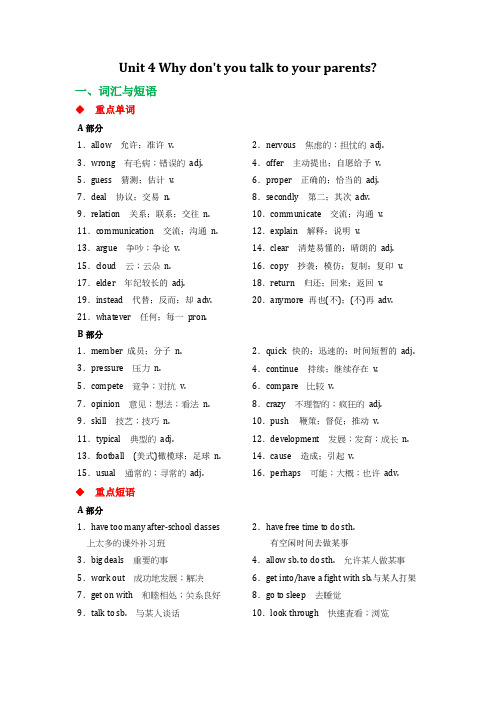
Unit 4 Why don't you talk to your parents?一、词汇与短语◆重点单词A部分1.allow 允许;准许v.2.nervous 焦虑的;担忧的adj. 3.wrong 有毛病;错误的adj.4.offer 主动提出;自愿给予v. 5.guess 猜测;估计v.6.proper 正确的;恰当的adj. 7.deal 协议;交易n.8.secondly 第二;其次adv. 9.relation 关系;联系;交往n.10.communicate 交流;沟通v. 11.communication 交流;沟通n.12.explain 解释;说明v.13.argue 争吵;争论v.14.clear 清楚易懂的;晴朗的adj. 15.cloud 云;云朵n.16.copy 抄袭;模仿;复制;复印v. 17.elder 年纪较长的adj.18.return 归还;回来;返回v. 19.instead 代替;反而;却adv.20.anymore 再也(不);(不)再adv. 21.whatever 任何;每一pron.B部分1.member 成员;分子n.2.quick 快的;迅速的;时间短暂的adj. 3.pressure 压力n.4.continue 持续;继续存在v. 5.compete 竞争;对抗v.6.compare 比较v.7.opinion 意见;想法;看法n.8.crazy 不理智的;疯狂的adj. 9.skill 技艺;技巧n.10.push 鞭策;督促;推动v. 11.typical 典型的adj.12.development 发展;发育;成长n. 13.football (美式)橄榄球;足球n.14.cause 造成;引起v.15.usual 通常的;寻常的adj.16.perhaps 可能;大概;也许adv.◆重点短语A部分1.have too many after-school classes 上太多的课外补习班2.have free time to do sth.有空闲时间去做某事3.big deals 重要的事4.allow sb. to do sth. 允许某人做某事5.work out 成功地发展;解决6.get into/have a fight with sb.与某人打架7.get on with 和睦相处;关系良好8.go to sleep 去睡觉9.talk to sb. 与某人谈话10.look through 快速査看;浏览11.get enough sleep 得到充足的睡眠12.call sb. up 给某人打电话13.on the phone 在电话中14.so that 以便;为了15.give sth. back to sb. 把某物归还给某人16.forget about sth. 忘记关于某事17.hang over 笼罩在……18.be nice to sb. 对某人友好19.until late at night 直到深夜20.refuse to do sth. 拒绝做某事21.let sb. do sth. 让某人做某事22.talk about sth. with sb.与某人谈论某事23.offer to do sth. 主动提出做某事24.be afraid of doing sth. 害怕做某事25.communicate with sb. 与某人交流B部分1.in one's opinion 依……看2.spend time alone 独自消磨时光3.a lot of pressure 许多压力4.not……until……直到……才……5.free time activities 业余活动6.have a quick dinner 很快吃完晚饭7.the common problem 普遍问题8.compare…with…把…和…作比较,对比9.cut out 删除;删去10.know about 了解11.be important for sth. 对……重要12.keep on doing sth. 一直做某事13.send sb. to……派某人去……14.worry about 担心15.give one's opinion about sth.就某事给出某人的观点16.differences and similarities 不同点和相似点17.too much pressure 太多的压力18.compete with sb. 与某人竞争19.think for oneself 为某人自己着想20.push sb. so hard 逼迫某人太紧21.cause a lot of stress for sb. 给某人造成很多压力◆重点句子A部分1.Why don't you go to sleep earlier this evening? 为什么你今晚不早点儿去睡觉呢?2.What's wrong with you? 你哪儿不舒服?3.Although she's wrong, it's not a big deal. 尽管她做得不对,但也没什么大不了的。
人教版八年级英语下册第四单元教案

Unit 4 Why don’t you talk to your parents教材解读本单元的中心话题是人际交往,与学生实际生活紧密相关,主要探讨当代中小学生所面临的种种压力和困境,并针对这些问题给予合理的建议。
通过学习本单元,学生应能询问、陈述自己或他人的困难和麻烦,能针对别人的困境提出解决的办法和建议。
语法部分主要是关于学生能正确使用情态动词could,should表达建议或劝告,能正确使用Why don’t you…句型表达建议,能正确使用连词until,so that,although 等。
通过学习本单元,学生应能反思生活中常见的家庭矛盾以与与家长、同学、朋友之间的沟通问题,并学会用正确的态度对待这些问题。
在本单元中学生还能了解中西方家长对待孩子参加课外活动和课外学习班的态度与做法,有利于学生学会换位思考,帮助他们逐步建立正确、积极的生活态度和价值观。
单元目标一、知识与技能1. 掌握重点词汇和短语:until,so that,although,look through,big deal,work out,get on with,cut out,compare…with,in one’s opinion2. 掌握重点句型:What’s wrong What’s the matter You could1 / 29/ should… Why don’t you…3. 培养听说读写各项基本技能同时注重培养在语境中猜测词意的能力。
二、过程与方法采用直观教学法、情景教学法、讨论、角色表演等方法,学习知识,培养能力,养成好习惯。
三、情感态度与价值观通过学习,了解生活、学习中常见的矛盾和困难,能合理表达自己的观点和看法,给别人提出合理的建议,逐步建立正确、积极的生活态度和价值观。
教法导航采用直观教学法,情景教学法,遵循以学生为主体的原则。
学法导航采用自主学习、小组合作、分角色表演等学习策略。
课时支配第1课时:Section A 1a-2d第2课时:Section A 3a-4c第3课时:Section B 1a-2e第4课时:Section B 3a-Self Check2 / 29课时教案第1课时Section A 1a-2d教学目标一、知识与技能1. 能掌握以下单词:allow,wrong,guess,deal,work out2. 能掌握以下句型:①---What’s wrong---I’m reall y tried because I studied until midnight last night.② You could give him a ticket to a ball game.③ I think you should ask your parents for some money.④ Why don’t you talk to him about it3. 能了解以下语法:①能够运用所学知识谈论问题和困难、提出建议并作出选择;②能根据对方所提出的问题,给出一些合理的建议。
八年级下册人教版英语第四单元2b知识点

八年级下册人教版英语第四单元2b知识点八年级下册人教版英语第四单元2b知识点是指本单元中学生需要掌握的重点知识和技能。
本单元主要围绕“高中学业规划”这一主题展开讲解,帮助学生建立正确的学业观念,制定合理的学业目标,为未来的学业规划做好准备。
以下是本单元2b课文的重点知识点。
1. Calm down and think carefully!冷静下来,仔细考虑!本句是教育读者制定学业目标时必须要注意的核心问题。
学生在制定学业目标时,应当充分考虑自身的实际情况和发展方向,做到目标合理、可行性高。
2. What are your goals for high school?你的高中目标是什么?本句是提醒读者要明确学业目标,根据自己的兴趣和特长做出相应的选择,制定个性化的学业规划。
同时也要注意合理性,不要过分追求短期目标而忽视长远发展。
3. Smart students like Huang Lei and Li Hua have already set their goals for high school.聪明的学生像黄磊和李华已经为高中制定了目标。
本句是引导读者借鉴优秀学生的学习方法和经验,学习他们积极向上的进取精神,结合自身实际情况,制定符合自己特点的学业规划。
4. You can try your best to achieve your goals.你可以尽力实现你的目标。
本句是强调学生要始终保持积极向上的心态,坚信自己能够做到,不怕困难与挫折,克服各种困难,努力朝着目标迈进。
5. Don't be afraid to ask for help from your teachers and parents.不要害怕向你的老师和家长寻求帮助。
本句是提醒学生在遇到困难或疑问时,不要独自承担,而是及时向老师和家长求助,寻求正确的解决方案,做到目标更稳妥。
总之,本单元2b知识点为学生提供了全面的学业规划指导,帮助他们制定了符合自身条件和发展方向的学业目标,增强了学生的自信心、积极性和自我认识,为未来的学业奠定了坚实的基础。
人教版八年级英语下册第四单元知识点汇总总结

人教版八年级英语下册第四单元知识点汇总总结01、重点短语1. look through 快速查看;浏览2. work out 成功地发展;解决3. get on with 和睦相处; 关系良好4. have free time to do sth.有空闲时间去做某事5. get into/have a fight with sb.与某人打架6. have too many after-school classes 上太多的课外补习班7. call sb. up 给某人打电话8. on the phone在电话中9. so that 以便10. give sth. back to sb.把某物归还给某人11. forget about sth. 忘记某事12. hang over 笼罩在……上方13. be nice to sb. 对某人友好14. refuse to do sth. 拒绝做某事15. offer to do sth. 主动做某事16. communicate with sb. 与某人交流17. agree/disagree with sb./sth.同意/不同意某人或某事物18. explain sth. to sb. 向某人解释某事19. common problems 普遍问题20. spend time alone 独自消磨时光21. free time activities 业余活动22. cut out 删除;删去23. all kinds of 各种各样的24. in one’s opinion 依……看25. give one’s opinion about sth.就某事给出某人的观点26. be important for/to sb.对某人来说重要27. know about 了解28. send sb. to…送某人去……29. too much pressure 太多的压力30. think for oneself 为某人自己着想31. keep on doing sth. 一直做某事32. worry about 担心33. differences and similarities不同点和相似点34. compete with sb. 与某人竞争35. cause a lot of stress for sb.给某人造成很多压力02、重点句子Grammar Focus 句子1. You look tired. What’s the matter?你看起来累,怎么啦?2. I studied until midnight last night so I didn’t get enough sleep.我昨晚学习直到半夜,所以我没有足够的睡眠。
- 1、下载文档前请自行甄别文档内容的完整性,平台不提供额外的编辑、内容补充、找答案等附加服务。
- 2、"仅部分预览"的文档,不可在线预览部分如存在完整性等问题,可反馈申请退款(可完整预览的文档不适用该条件!)。
- 3、如文档侵犯您的权益,请联系客服反馈,我们会尽快为您处理(人工客服工作时间:9:00-18:30)。
八年级英语下册第四单元Unit4 He said I was hard-working.第一课时Section A 1a---2c达标测试题A卷1 翻译1)曾经;永远___________ 2) 疯狂的;狂热的________________3) 再;还;今后____________ 4) 小吃_________5) 直接引语_________________ 6)间接引语__________________7)肥皂剧_______________ 8)为某人举办晚会___________________9) 生某人的气_______________ 10) 来我家学习_______________________ 2 完成句子1)What _____ she say ?(她说了什么?)2) He said I was _______________ (努力学习)。
3)She said she was having a ________(惊讶的)party for Lana on Friday night .4)I am ______ _______ Marcia.(生某人的气)5)I am not _______ _____ ____ ________(打算去她家) on Friday night .6)Lana thinks she’s _______ ___ _____ ______ (来我家)to study.7) I am ___ _____ _______ Marcia ________.( 不再生某人的气)。
8)I will _____(带) some drinks and snacks _____ _____ ______( 去你家)第一课时Section A 1a---2c达标测试题A卷参考答案1)ever 2) mad 3) anymore 4) snack5) direct speech 6) reported speech7) a soap opera 8 ) have a party for sb9) be mad at sb 10) come to my house to stud2 1) did 2) hard-working 3) surprise 4) mad at 5) going to her house6) coming to my house 7) not mad at … anymore 8) bring to your house八年级英语下册第四单元Unit4 He said I was hard-working.第一课时Section A 1a---2c达标测试题B卷1 翻译1)ever ______ ________ 2) mad ______ ________3) anymore ____ ______ ______ 4) snack ____________________5) direct speech _______________ 6) reported speech ________________7) a soap opera ________________8) have a party for sb ______________9) be mad at sb _______________ 10) come to my house to study _______________ 2 完成句子1)____ _____ _______ (你曾经)watch soap operas ?2)What are some things that ________ ______(偶然发生) soap operas ?3)Ben ______ (告诉) Lana that Marcia was going to having a party for her .4) Lana _______(说) she was _____ mad at Marcia _______(不再)5)Marcia ______ ________ ( 给每一个人打电话) and _____ ______(告诉他们)6)She _____ _______ _______ (将不再)have a party .7)I ___ _____ ____ _______ ____ Lana .(我将要为举办一个晚会)8)I _____ ______ ______ ______ (去海滩)every Saturday.第一课时Section A 1a---2c达标测试题B卷参考答案1)曾经;永远2) 疯狂的;狂热的3) 再;还;今后4) 小吃5) 直接引语6)间接引语7)肥皂剧8)为某人举办晚会9) 生某人的气10) 来我家学习2 1) do you ever 2) happen on 3) told 4) said not anymore5) called everyone told them 6) wasn’t going to7) am having a party for 8) go to the beach八年级英语下册第四单元Unit4 He said I was hard-working.第一课时Section A 1a---2c达标测试题C 卷翻译1)什么是肥皂剧?___________________________________________________________2)你知道些什么肥皂剧?_________________________________________________________3) 你曾经看过肥皂剧吗?___________________________________________________________4) 肥皂剧中发生了什么事情?___________________________________________________________5) 我生Marcia 的气.____________________________________________________________6)周五晚我要为Lana 举办一个让她吃惊的晚会。
____________________________________________________________7)Lana 想来我家学习.___________________________________________________________8)Lana 说她不再生Marcia 的气了。
___________________________________________________________9)我明天将给你打电话。
_______________________________________________________________10)他告诉我说他将明天给我打电话。
_______________________________________________________________11)我会说三种语言。
________________________________________________________________ 12)她说她会说三种语言。
_________________________________________________________________第一课时Section A 1a---2c达标测试题C 卷参考答案1)What is a soap opera ?2) What are some soap operas you know ?3) Do you ever watch soap operas ?4) What are some things that happen on soap operas ?5) I am mad at Marcia6) I am having a surprise party for Lana on Friday ninght.7) Lana thinks she is coming to my house to study .8) Lana sa id she wasn’t mad at Marcia anymore.9) I will call you tomorrow .10) He told me he would call me tomorrow.11) I can speak three languages.12) She said she could speak three languages.八年级英语(下) Unit 4 He said I was hard-working.(Section A 3a-4)A卷一.根据句意和首字母提示,补全单词。
1.Lily is not here now, Can I take a m____________.2.As a student, we are s__________ to study hard.3.I am m_______ at Sam.4.I b______ a new bike yesterday.5.A: what is the m__________ of the word? B: It means”go on”6.The film is very i________, I like it very much.二.完成句子1.你上课应该认真听讲。
You _______ _________ _________ listen carefully in class.2.她说她不再生丽丽的气了.She said she ________ mat at Lily ________.3.请给汤姆捎个口信。
Please ________ ________ ________ ________ Tom.4.李雷告诉琳达把作业带到学校。
Li Lei told Linda that she ________ homework ________ school.5.5上海是中国最大的城市之一Shang Hai is ________ _________ _________ ________ ________ in China.6.并非每个人都能成功。
________ _________can be successful.八年级英语(下) Unit 4 He said I was hard-working.(Section A 3a-4) A卷参考答案一. 1 massage 2 supposed 3 mad 4bought 5 meaning 6. interesting二、1are supposed to2. was not…..anymore3. take a message for4. brought ….. to5. one of the biggest cities6. Not everyone八年级英语(下) Unit 4 He said I was hard-working. (Section A 3a-4)第二课时达标测试题 B 卷一.汉译英。
